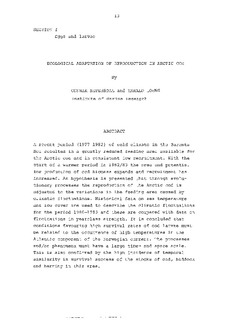Ecological adaption of reproduction in Arctic cod
Conference object
Permanent lenke
http://hdl.handle.net/11250/107481Utgivelsesdato
1984Metadata
Vis full innførselSamlinger
- Symposium proceedings [168]
Sammendrag
A recent period (1977-1982) of cold climate in the Barents
Sea resulted in a greatly reduced feeding area available for
the Arctic cod and in consistent low recruitment. With the
start of a warmer period in 1982/83 the area and potential
for production of cod biomass expands and recruitment has
increased. An hypothesis is presented that through evolutionary
processes the reproduction of the Arctic cod is
adjusted to the variations in the feeding area caused by
climatic fluctuations. Historical data on sea temperature
and ice cover are used to describe the climatic fluctuations
for the period 1900-1983 and these are compared with data on
fluctuations in yearclass strength. It is concluded that
conditions favouring high survival rates of cod larvae must
be related to the occurrence of high temperatures in the
Atlantic component of the Norwegian current. The processes
and/or phenomena must have a large time- and space scale.
This is also confirmed by the high incidence of tempora1
similarity in survival success of the stocks of cod, haddock
and herring in this area.
Beskrivelse
The proceedings of the Soviet-Norwegian symposium on: Reproduction and recruitment of Arctic cod. Leningrad 26 - 30 September 1983.
Serie
PINRO-IMR Symposium1
